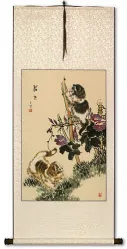Many custom options...
And formats...

Misery Loves Company in Chinese / Japanese...
Buy a Misery Loves Company calligraphy wall scroll here!
Misery Loves Company
同病相憐 is a Chinese proverb that means “fellow sufferers empathize with each other” or to match it with a western idiom, “misery loves company.” This is also somewhat known in Korean Hanja.
This could be two people who were just dumped by a girlfriend/boyfriend or just divorced. They're drawn together either by their misery or because of the need to share their miserable experience with someone else.
同病相憐 is probably the saddest proverb in our collection.
Literally, the characters mean:
同 together with
病 illness, sickness, disease (in this case, just the mental anguish after some kind of event or life issue)
相 mutual, reciprocal, each other
憐 pity, sympathize
In Japanese, this is written with two extra Hiragana on the end like this: 同病相憐れむ
If you want the Japanese version,
don’t
use the button above but click here instead: Misery Loves Company in Japanese
This in-stock artwork might be what you are looking for, and ships right away...
Gallery Price: $60.00
Your Price: $36.88
Not the results for Misery Loves Company that you were looking for?
Below are some entries from our dictionary that may match your Misery Loves Company search...
| Characters If shown, 2nd row is Simp. Chinese |
Pronunciation Romanization |
Simple Dictionary Definition |
同病相憐 同病相怜 see styles |
tóng bìng xiāng lián tong2 bing4 xiang1 lian2 t`ung ping hsiang lien tung ping hsiang lien |
More info & calligraphy: Misery Loves Company |
The following table may be helpful for those studying Chinese or Japanese...
| Title | Characters | Romaji (Romanized Japanese) | Various forms of Romanized Chinese | |
| Misery Loves Company | 同病相憐 同病相怜 | doubyou shou awaremu doubyoushouawaremu dobyo sho awaremu | tóng bìng xiāng lián tong2 bing4 xiang1 lian2 tong bing xiang lian tongbingxianglian | t`ung ping hsiang lien tungpinghsianglien tung ping hsiang lien |
| In some entries above you will see that characters have different versions above and below a line. In these cases, the characters above the line are Traditional Chinese, while the ones below are Simplified Chinese. | ||||
Successful Chinese Character and Japanese Kanji calligraphy searches within the last few hours...








